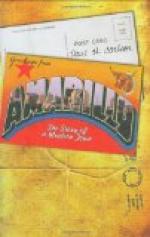The day this staggering blow fell on her, Mrs. Carriswood was in her dressing-room, peacefully watching Derry unpack a box from Paris, in anticipation of a state dinner. And Miss Van Harlem, in a bewitching wrapper, sat on the lounge and admired. Upon this scene of feminine peace and happiness enter the Destroyer, in the shape of a note from Tommy Fitzmaurice! Were they going on Beatoun’s little excursion to Alexandria? If they were, he would move heaven and earth to put off a committee meeting, in order to join them. By the way, he was to get the floor for his speech that afternoon. Wouldn’t Mrs. Carriswood come to inspire him? Perhaps Miss Van Harlem would not be bored by a little of it.
It was a well-worded note; as Mrs. Carriswood read it she realized for the first time how completely Tommy was acclimated in society. She remembered his plaint years ago, and his awe of “oil paintings” and “people of culture;” and she laughed half-sadly as she passed the note over to Miss Van Harlem.
“I presume it is the Alexandria excursion that the Beatouns were talking about yesterday,” she said, languidly. “He wants to show that young Irishman that we have a mild flavor of antiquity, ourselves. We are to see Alexandria and have a real old Virginian dinner, including one of the famous Beatoun hams and some of the ’69 Cha-teau Yquem and the sacred ’47 port. I suppose he will have the four-in-hand buckboard. ’A small party ’— that will mean the Honorable Basil Sackville, Mrs. Beatoun, Lilly Denning, probably one of the Cabinet girls, Colonel Turner, and that young Russian Beatoun is so fond of, Tommy Fitzmaurice ------”
“Why do you always call Mr. Fitzmaurice Tommy?”—this interruption comes with a slight rise of color from young Margaret.
“Everybody calls him Tommy in his own town; a politician as popular as he with the boys is naturally Tommy or Jerry or Billy. They slap him on the back or sit with an arm around his neck and concoct the ways to rule us.”
“I don’t think anyone slaps Mr. Fitzmaurice on the back and calls him Tommy, now,” says Margaret, with a little access of dignity.
“I dare say his poor old father and mother don’t venture on that liberty; I wish you had seen them ——”
“He has told me about them,” says Margaret.
And Mrs. Carriswood’s dismay was such that for a second she simply gasped. Were things so far along that such confessions were made? Tommy must be very confident to venture; it was shrewd, very shrewd, to forestall Mrs. Carriswood’s sure revelations—oh, Tommy was not a politician for nothing!
“Besides,” Margaret went on, with the same note of repressed feeling in her voice, “his is a good family, if they have decayed; his ancestor was Lord Fitzmaurice in King James’s time.”
“She takes him seriously too!” thought Mrs. Carriswood, with inexpressible consternation; “what shall I say to her mother?”




